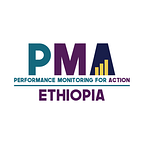Reproductive, maternal, and newborn health services during COVID-19 — did things change in the early stages of the pandemic?
By Ellie Qian and Linnea Zimmerman
Since the outbreak of the COVID-19 pandemic, many expressed concerns about the potential disruptions in reproductive, maternal, and newborn health (RMNH) services in low- and middle-income countries like Ethiopia. Facing challenges of infection control and staff shortage, health sectors may diverge resources from RMNH services towards emergency response. On the demand side, movement restrictions and income loss may hinder women in need of these services from accessing care. However, hypothesis aside, what do women’s actual experiences tell us about the impact of COVID-19 on RMNH service utilization? Researchers from The Lives Saved Tool and PMA Ethiopia answered this question in a recent study.
Using two samples of recently postpartum women who gave birth either before (August 2019 to January 2020) or during COVID-19 (March to July 2020), this study found little change in RMNH services in the early stages of the pandemic. There were no significant reductions in neither service coverage nor quality when comparing these two cohorts of women. Interestingly, care-seeking for complications during pregnancy, delivery, and post-delivery increased among women who delivered during COVID-19 — a change largely driven by more care-seeking by rural women. Another upward trend was observed in postpartum family planning. A greater proportion of women who delivered during the pandemic were using some form of family planning at approximately six-week postpartum. This was mainly driven by a nearly seven-fold increase in postpartum family planning usage among women in Addis Ababa.
As we have seen in other research that investigated the impact of COVID-19 on health services, national-level findings can mask differences by region and urbanicity. Indeed, it appeared that COVID-19 affected RMNH services differently in urban and rural areas. For example, an increase in postnatal care within 48 hours, polio vaccination, and care-seeking for neonatal illness in the COVID-19 affected cohort was observed in rural areas but not urban areas, not including Addis Ababa. Some changes, such as a decline in BCG vaccination in children born during COVID-19, were unique to Addis Ababa.
By and large, this study gave some reassurance that COVID-19 did not negatively impact RMNH services in the early periods. This demonstrated the government of Ethiopia’s prompt, well-constructed pandemic response measures and strong leadership commitment to sustaining essential health services during crisis. As Ethiopia thrives to make improvements on RMNH through policies and various initiatives, it is important that these efforts are maintained and event strengthened during the pandemic era to prevent indirect loss of life.
For more details, check out the full publication.
